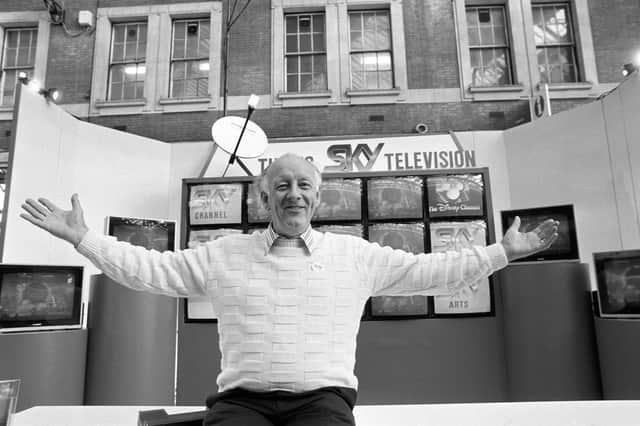Obituary: Frank Bough, broadcaster


Frank Bough, who has died at 87, was one of the most popular and oft-seen faces on TV in the 1970s and 1980s, until scandal ruined his career.
The host of programmes as diverse as Grandstand and Breakfast Time, he had begun his screen career as host of the BBC’s first local news programme in the North-east, Home at Six, which was introduced by a hat being placed on a stand during the opening titles.
Advertisement
Hide AdAdvertisement
Hide AdBut it was in the sports department that he won his spurs, unflappably anchoring six World Cups, six Olympic Games and at least a dozen Five Nations championships for the BBC – during which time he also succeeded the late David Coleman as host of Grandstand.
He worked for ITV, too, hosting the 1991 Rugby Union World Cup in the UK and France.
Alongside his sports commitments, he presented the nightly current affairs programme Nationwide for much of the 1970s, a job which increased his weekly screen time to around 12 hours and helped make him a household name.
In 1983, Bough was recruited to help to launch the corporation’s first breakfast TV programme, conceived in a hurry to compete with the new TV-am service on ITV.
Advertisement
Hide AdAdvertisement
Hide AdAlong with his co-hosts, Nick Ross and especially Yorkshire’s Selina Scott, he surprised audiences – and many inside the BBC – with an informal style that set the tone for the many programmes which followed through the decade. Breakfast Time became the leading programme in its slot, until TV-am abandoned the journalistic high ground and went down market.
But in 1988 Bough’s upward trajectory hit the buffers. A Sunday newspaper pictured him attending what was described as a “sado-masochistic vice den”, and amid further allegations of drug taking, he was abruptly sacked.
In an interview in 1992, Bough spoke of his regret over the incident and said his behaviour had been “exceedingly stupid”, apologising for the pain it had caused his wife and family.
Following the scandal, he attempted to rebuild his broadcasting career on Sky and a London Weekend Television show, and also enjoyed a stint on LBC radio in the early 1990s. The station attracted complaints from listeners, who said it was spending money on high-salaried presenters such as Bough while skimping on journalism.
Advertisement
Hide AdAdvertisement
Hide AdHe survived the takeover of LBC by London News Radio in 1994 and later that year presented a breakfast show along with fellow broadcaster, Brian Hayes.
Francis Bough was born in a two-up, two-down terrace in Stoke-on-Trent in January 1933. When his father lost his job in the upholstery business, the family moved to Oswestry in Shropshire.
A keen sportsman, Bough part in productions of Shakespeare at the local grammar school, and gained a scholarship to Merton College, Oxford, where his football skills won him a Blue, although his side was beaten by Cambridge in the Varsity match at Wembley.
After National Service in the Royal Tank Regiment, he took a job as a graduate trainee with ICI in County Durham but was determined to pursue a course in broadcasting – and after several years of badgering, the BBC gave him a three-month contract to report on football matches in the Newcastle region. It was an entrée which led to regional TV and, in 1964, to him taking over from Peter Dimmock as host of the networked Sportsview.
Bough is survived by his wife, Nesta, whom he married in 1959, and their three sons.
Comment Guidelines
National World encourages reader discussion on our stories. User feedback, insights and back-and-forth exchanges add a rich layer of context to reporting. Please review our Community Guidelines before commenting.